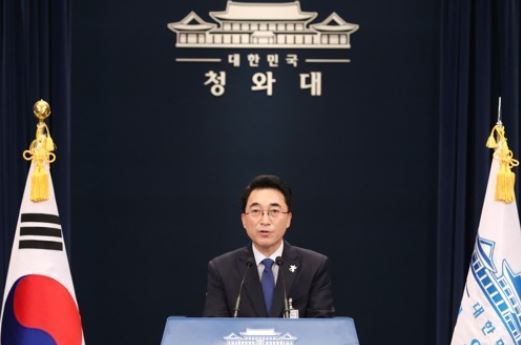The presidential office Cheong Wa Dae has discovered additional documents from the preceding government that shed more light on the alleged misdeeds of the ousted former president and her aides, its spokesman said Thursday.
More than 500 documents contained information about the former government's support for conservative polemic writers and civic groups, and the controversial plan to merge two Samsung affiliates, seen as part of the family-run conglomerate's power succession scheme.
 |
Presidential spokesman Park Soo-hyun speaks during a press conference at the presidential office Cheong Wa Dae in Seoul on July 20, 2017. (Yonhap) |
The documents, dated from March 2013 to October 2016, were found in an office used by a secretary subordinate to the former senior presidential secretary for policy coordination, Cheong Wa Dae spokesman Park Soo-hyun told reporters.
The release is the latest in a series of document discoveries that Cheong Wa Dae has recently made public "in light of citizens' right to know."
"They hint that Cheong Wa Dae (under the former Park Geun-hye government) apparently directly spearheaded the efforts to spread a specific ideology," Park said, pointing to the plans in the documents to foster conservative writers and offer financial support to rightwing civic groups.
Among the documents was one on "the direction for the exercise of the National Pension Service's voting rights with regards to Samsung's merger plan.
The NPS, then a major shareholder of Samsung companies, is suspected of voting in favor of a merger between two Samsung affiliates, which in turn is widely believed to have helped strengthen the group's de facto leader Lee Jae-yong's control over the conglomerate.
The Samsung heir, Lee, is currently standing trial on charges of offering bribes to the former leader and her friend Choi Soon-sil allegedly in exchange for the NPS' support for the merger scheme.
The spokesman pointed out that another document dealt with how to respond in the case of foreign hedge funds' "aggressive interference" in the conglomerate's managerial rights. (Yonhap)





![[Exclusive] Hyundai Mobis eyes closer ties with BYD](http://res.heraldm.com/phpwas/restmb_idxmake.php?idx=644&simg=/content/image/2024/11/25/20241125050044_0.jpg)
![[Herald Review] 'Gangnam B-Side' combines social realism with masterful suspense, performance](http://res.heraldm.com/phpwas/restmb_idxmake.php?idx=644&simg=/content/image/2024/11/25/20241125050072_0.jpg)

